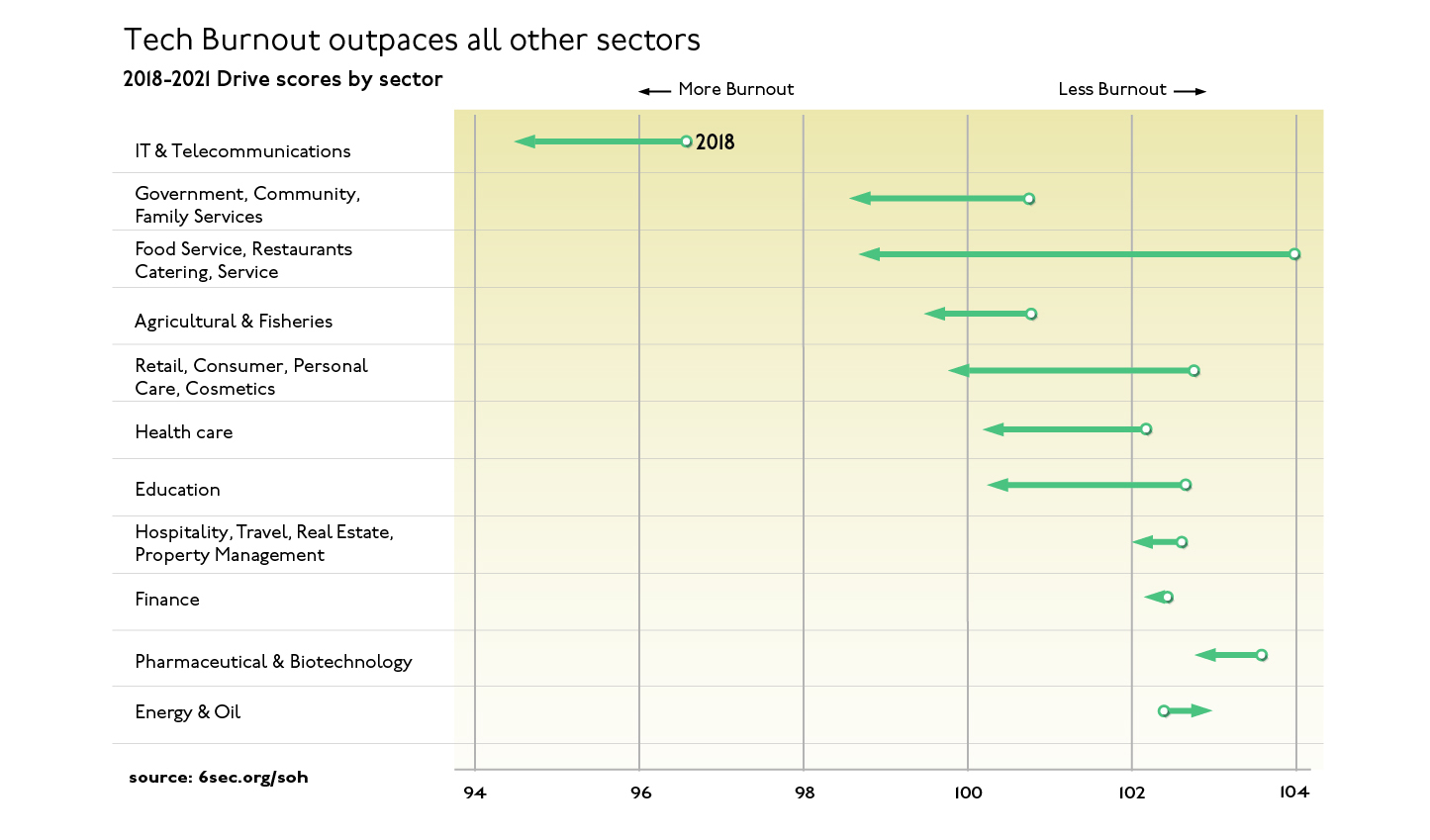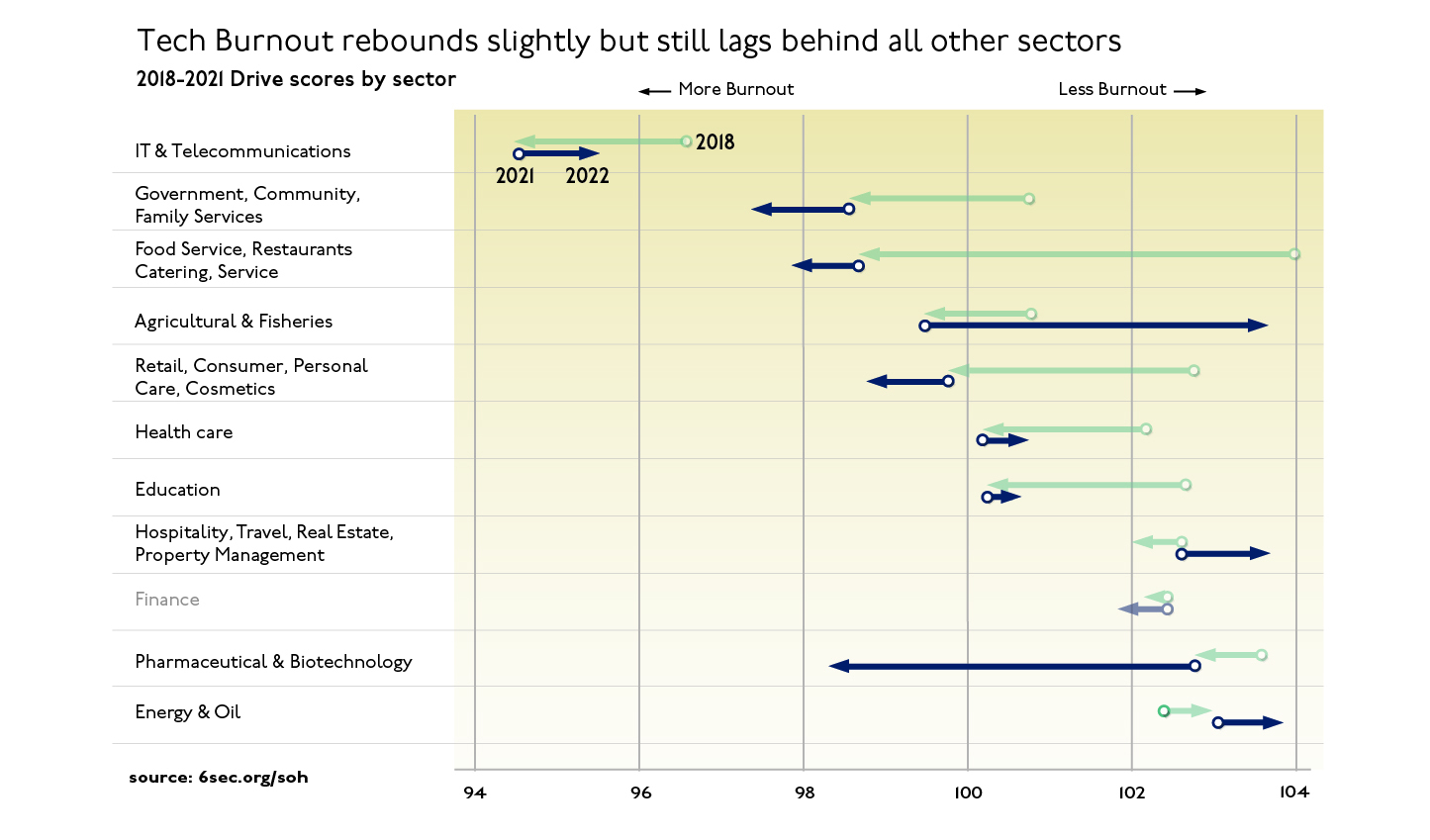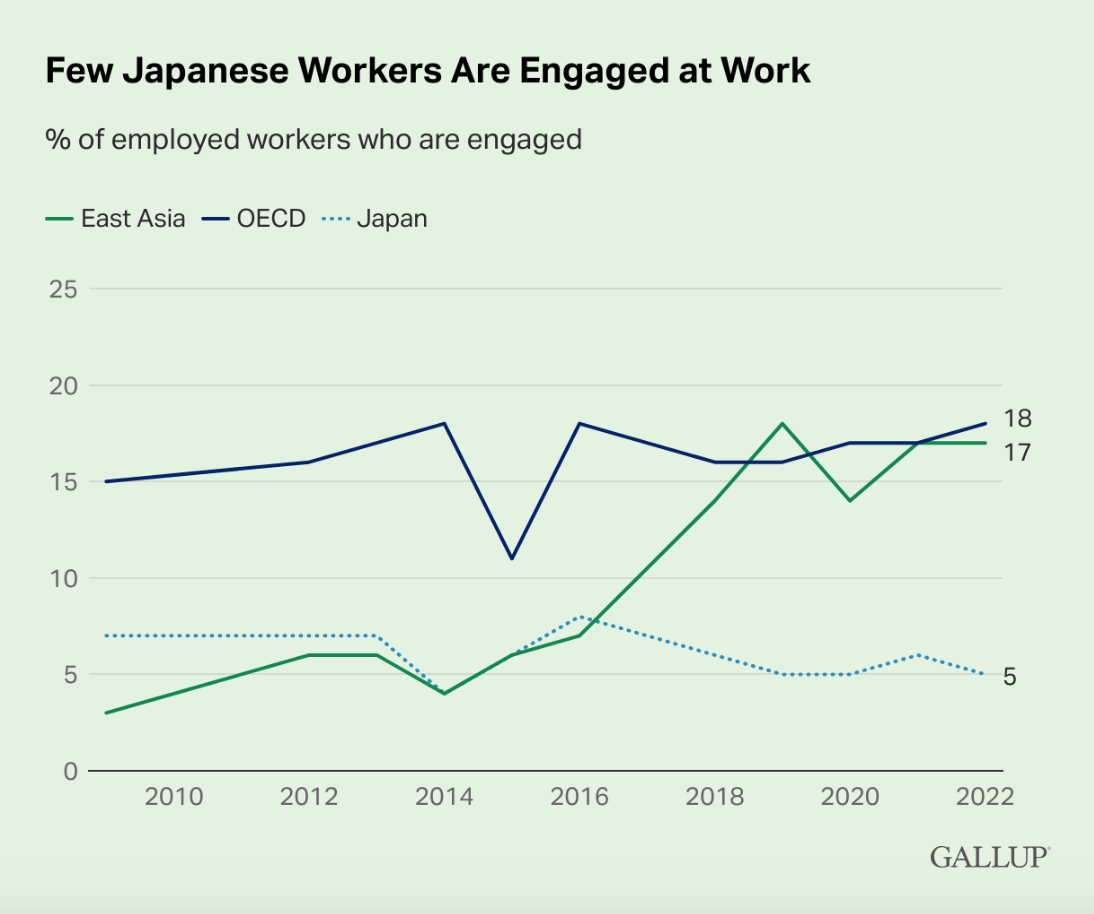Emotional Intelligence at Work
By Michael Miller

Where Workers Are Struggling the Most<\/h1>\n
September 2023<\/em><\/p>\n <\/p>\n This is Emotional Intelligence at Work, a newsletter about workplace culture, employee wellbeing, and how to create sustainable, thriving businesses. <\/em>This is the browser version. If you want to get the monthly newsletter free in your inbox, you can subscribe here<\/a>.<\/em><\/p>","tablet":""}},"slug":"et_pb_text"}" data-et-multi-view-load-tablet-hidden="true">
September 2023 This is Emotional Intelligence at Work, a newsletter about workplace culture, employee wellbeing, and how to create sustainable, thriving businesses.This is the browser version. If you want to get the monthly newsletter free in your inbox, you cansubscribe here.Where Workers Are Struggling the Most
Tech appears to have a worker wellbeing problem – and leaders could be making it worse with strict return-to-office mandates.<\/p>\n
How bad is the current situation?<\/p>\n
In the latest edition of the world\u2019s largest study of emotional intelligence<\/a>, IT scored the lowest of any sector on average emotional intelligence – and the highest on burnout. Here\u2019s a sneak peak. The full report is set to be published next month.\u00a0<\/p>\n This graph shows burnout by sector from 2018-2021. IT is at the very top.<\/p>","tablet":""}},"slug":"et_pb_text"}" data-et-multi-view-load-tablet-hidden="true">
Tech appears to have a worker wellbeing problem – and leaders could be making it worse with strict return-to-office mandates. How bad is the current situation? In the latest edition ofthe world’s largest study of emotional intelligence, IT scored the lowest of any sector on average emotional intelligence – and the highest on burnout. Here’s a sneak peak. The full report is set to be published next month. This graph shows burnout by sector from 2018-2021. IT is at the very top.1. What’s wrong in Tech?
Then, from 2021 to 2022, burnout in IT got slightly better - but still lags far behind every other sector - which means they\u2019re experiencing more burnout.<\/p>"}},"slug":"et_pb_text"}" data-et-multi-view-load-tablet-hidden="true">
Then, from 2021 to 2022, burnout in IT got slightly better – but still lags far behind every other sector – which means they’re experiencing more burnout.
There are many factors at play here – including massive layoffs last year, a shifting economic environment, and recent return-to-office mandates.<\/p>\n
But without a doubt, tech leaders are playing a risky game by doubling down on return-to-office mandates – even reversing earlier decisions in some cases.<\/p>\n
Go deeper \u2192<\/a><\/p>\n 2. Engaged at work? In Japan, it’s rare<\/strong><\/span><\/p>\n Employee engagement in Japan is alarmingly low, according to Gallup.<\/a>\u00a0<\/p>\n Even compared to the global average of just 23%, Japan\u2019s 5% employee engagement stands out. In fact, it\u2019s very low compared to other high income economies and its geographic neighbors.\u00a0<\/p>\n Check out this graph comparing Japan to its fellow member states of the Organisation for Economic Co-operation and Development (OECD) and its neighbors in East Asia:<\/p>","tablet":""}},"slug":"et_pb_text"}" data-et-multi-view-load-tablet-hidden="true">
New researchfrom HR software company BambooHR corroborated these findings of tough times in tech: Employees in the tech industry recorded the sharpest decline in happiness over the past three years (-145%) of any sector. There are many factors at play here – including massive layoffs last year, a shifting economic environment, and recent return-to-office mandates. But without a doubt, tech leaders are playing a risky game by doubling down on return-to-office mandates – even reversing earlier decisions in some cases. 2. Engaged at work? In Japan, it’s rare Employee engagement in Japan is alarmingly low,according to Gallup. Even compared to the global average of just 23%, Japan’s 5% employee engagement stands out. In fact, it’s very low compared to other high income economies and its geographic neighbors. Check out this graph comparing Japan to its fellow member states of the Organisation for Economic Co-operation and Development (OECD) and its neighbors in East Asia:\u00a0<\/h3>\n
The research suggests that work-life balance and employee engagement are still a major problem.<\/p>\n
\u00a0<\/h3>\n
3. Giving hard feedback… to a robot?<\/strong><\/span><\/p>\n Will business students of the future learn essential soft skills in virtual reality?<\/p>\n Meta sure hopes so.<\/p>\n The tech giant is donating $300 Quest 2 headsets to 15 U.S. universities that use VR as a pedagogical tool.<\/p>\n The VR headsets will be put to different uses at the different universities. Suffolk University students will use them to observe molecular structures in 3D. Arizona State students will use them to learn and practice foreign languages. But at Stanford University and the University of Iowa, professors will use them to teach “soft skills” to business school students \u2014 like how to have a difficult conversation with an employee.<\/p>\n This could help solve a longstanding problem with management: People often get promoted for technical skills or performance, not for how well they manage people. Then, there is no practice space. Unlike learning a musical instrument or a language, where the path to improvement is clear, managing people is messy. Leaders could spend 10,000 hours<\/a> making the same mistakes, over and over again.<\/p>\n With these specialized tools, the hope is to create a practice space for soft skills.<\/p>\n And until your personal robot arrives, come learn with Six Seconds!<\/a><\/p>\n <\/p>\n Thank you for reading the browser version of Emotional Intelligence at Work, a newsletter about workplace culture, employee wellbeing, and how to create sustainable, thriving businesses.<\/em>\u00a0If you want to get the monthly newsletter free in your inbox, you can subscribe here<\/a>.<\/em><\/span><\/p>\n <\/p>\n <\/p>","tablet":""}},"slug":"et_pb_text"}" data-et-multi-view-load-tablet-hidden="true">
What’s going on? One part of the explanation is low emotional intelligence. Asia had the lowest average EQ of any of the 7 geographic regions in theState of the Heart report– and emotional intelligence is correlated with employee engagement – for both managers and employees. But there is also a long cultural history here. The Japanese termkaroshi— “death from overwork” — was coined back in the 1970s. 研究表明,工作与生活的平衡和employee engagement are still a major problem. 3. Giving hard feedback… to a robot? Will business students of the future learn essential soft skills in virtual reality? 元肯定hopes so. The tech giant is donating $300 Quest 2 headsets to 15 U.S. universities that use VR as a pedagogical tool. The VR headsets will be put to different uses at the different universities. Suffolk University students will use them to observe molecular structures in 3D. Arizona State students will use them to learn and practice foreign languages. But at Stanford University and the University of Iowa, professors will use them to teach “soft skills” to business school students — like how to have a difficult conversation with an employee. This could help solve a longstanding problem with management: People often get promoted for technical skills or performance, not for how well they manage people. Then, there is no practice space. Unlike learning a musical instrument or a language, where the path to improvement is clear, managing people is messy. Leaders couldspend 10,000 hoursmaking the same mistakes, over and over again. With these specialized tools, the hope is to create a practice space for soft skills. And until your personal robot arrives,come learn with Six Seconds! Thank you for reading the browser version of Emotional Intelligence at Work, a newsletter about workplace culture, employee wellbeing, and how to create sustainable, thriving businesses.If you want to get the monthly newsletter free in your inbox, you cansubscribe here.
- Tech Is In Trouble: Will Return to Office Mandates Make it Even Worse?- September 20, 2023
- Emotional Intelligence at Work: Where Workers Are Struggling Most- September 20, 2023
- EQ Educator News: Where Have All the Students Gone?- September 13, 2023





